Alcohol poisoning in dogs is a serious and potentially life-threatening condition that every pet owner should be aware of. While it’s common knowledge that alcohol is harmful to pets, many people may not realize how little it takes to cause severe damage. Dogs are highly sensitive to ethanol, the active ingredient in alcoholic beverages, as well as other alcohols found in household items like hand sanitizers, mouthwashes, and even fermented foods.
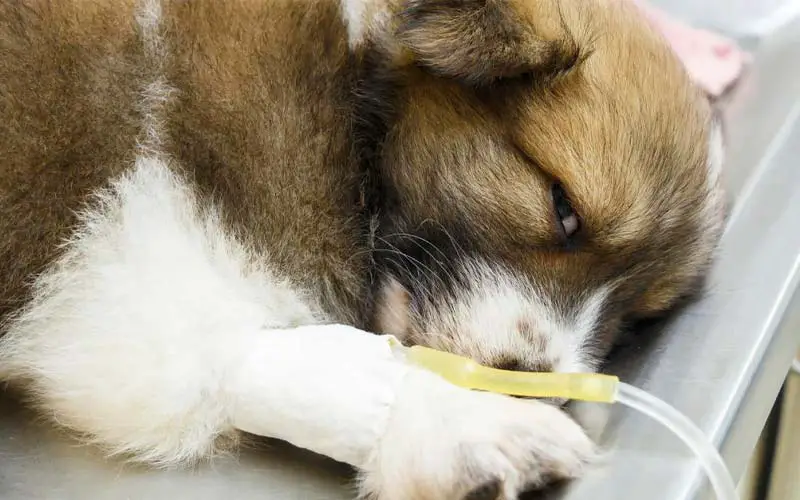
The symptoms of alcohol poisoning can develop rapidly, often within minutes of ingestion, and range from mild coordination loss to life-threatening respiratory failure. Understanding the dangers, recognizing the signs, and knowing how to respond in an emergency can make all the difference in ensuring your dog’s safety.
This article will provide a comprehensive guide to alcohol poisoning in dogs, covering its causes, symptoms, prevention tips, and what to do if your dog accidentally consumes alcohol. By equipping yourself with this knowledge, you can take proactive steps to protect your furry companion from an easily preventable yet dangerous risk.
1. Understanding Alcohol Poisoning in Dogs
Alcohol poisoning in dogs occurs when they ingest substances containing ethanol, methanol, or isopropanol, which are toxic to their systems. Ethanol, found in alcoholic beverages and fermenting products, is the most common cause. Methanol and isopropanol, present in household items like cleaning solutions and hand sanitizers, are equally dangerous. Even small amounts can be life-threatening, especially for smaller dogs.
Dogs are more sensitive to alcohol than humans due to their smaller body size, faster metabolism, and lack of specific enzymes needed to break down alcohol effectively. When alcohol enters their system, it is rapidly absorbed into the bloodstream, affecting the central nervous system and vital organs. This rapid onset of effects can lead to symptoms such as vomiting, lack of coordination, and respiratory depression within minutes.
Many everyday items and foods can expose dogs to alcohol unintentionally. These include:
- Alcoholic beverages: Beer, wine, spirits, and cocktails.
- Uncooked bread dough: Yeast fermentation produces ethanol, which can expand in a dog’s stomach and cause poisoning.
- Spoiled or fermenting fruits: Natural sugars ferment and produce alcohol.
- Household products: Hand sanitizers, mouthwashes, and cleaning agents.
- Medications or herbal tinctures: Many contain alcohol as a base ingredient.
Understanding these sources and how alcohol affects dogs is crucial for prevention. Knowing what substances to keep out of reach and recognizing the heightened sensitivity of dogs to alcohol are the first steps in protecting your pet from this preventable danger.
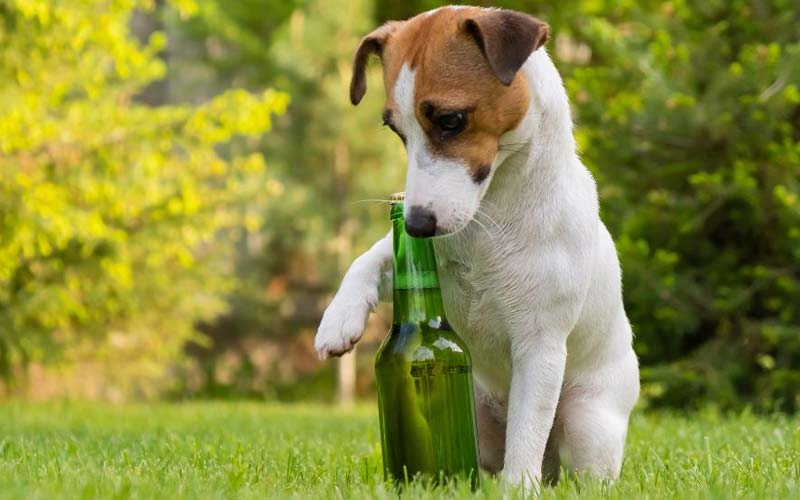
2. Symptoms of Alcohol Poisoning in Dogs
The symptoms of alcohol poisoning in dogs can appear quickly, often within 30 minutes to an hour of ingestion. The severity of these symptoms depends on the dog’s size, the amount of alcohol consumed, and the type of alcohol ingested. Smaller dogs and those exposed to concentrated forms of alcohol are at higher risk of severe or fatal reactions.
Common symptoms include:
- Vomiting and diarrhea
- Loss of coordination (ataxia)
- Excessive drooling or panting
- Lethargy or extreme drowsiness
- Rapid or slow heart rate
- Low body temperature (hypothermia)
- Tremors or seizures
- Coma or unconsciousness
In mild cases, dogs may exhibit nausea and disorientation, while more severe cases can lead to respiratory depression, organ failure, and death. The rapid absorption of alcohol into the bloodstream is why symptoms escalate so quickly, making immediate action critical.
The severity of alcohol poisoning is particularly dangerous for small dogs, as even a small amount of alcohol can lead to toxic levels in their bloodstream. Larger dogs may tolerate slightly higher doses before showing symptoms, but no amount of alcohol is ever safe. Prompt veterinary intervention is essential to minimize complications and ensure the best possible outcome.
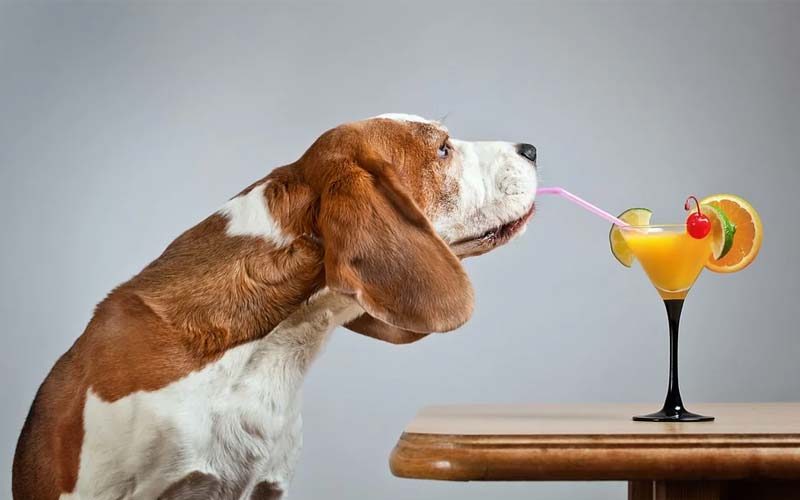
3. Immediate Actions to Take if Your Dog Consumes Alcohol
If you suspect your dog has consumed alcohol, quick action is essential to prevent severe complications. Here’s a step-by-step guide on what to do:
Assess the Situation
Determine the type and amount of alcohol your dog ingested. Was it a sip of beer, a larger quantity of spirits, or exposure to a household product containing alcohol? This information will help your veterinarian or poison control provide accurate guidance.
Contact a Veterinarian or Poison Control
Immediately call your veterinarian or a pet poison control hotline, such as the ASPCA Animal Poison Control Center. Provide them with details about your dog’s size, weight, the alcohol source, and the amount consumed. They will instruct you on the next steps.
Avoid Inducing Vomiting
Do not try to make your dog vomit unless specifically directed by a professional. Some alcohols can cause further harm during regurgitation, and inducing vomiting may worsen the situation.
Provide Comfort While Seeking Help
Keep your dog calm and in a safe environment. Prevent them from moving excessively to reduce the risk of injury if they are disoriented. If possible, monitor their breathing and heart rate while waiting for medical advice or transport to the vet.
Act Quickly for Veterinary Care
Early intervention is crucial. Alcohol poisoning can escalate rapidly, affecting vital organs and the nervous system. Veterinarians can provide lifesaving treatments such as IV fluids, oxygen therapy, and medications to stabilize your dog.
By acting quickly and seeking professional help, you can greatly improve your dog’s chances of a full recovery. Prevention remains the best strategy, but prompt action during an emergency can save your pet’s life.
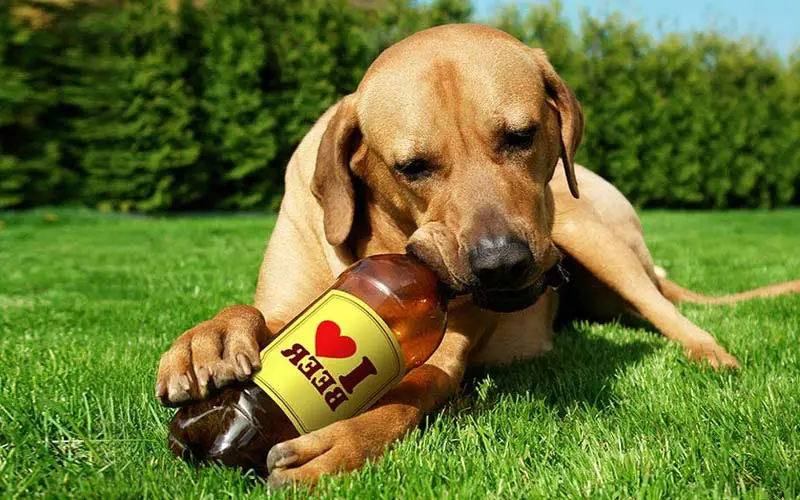
4. Prevention Tips for Dog Owners
Preventing alcohol poisoning in dogs starts with creating a safe environment and educating everyone in your household about the risks. Here are practical tips to keep your pet safe:
Secure Storage of Alcohol and Related Substances
Always store alcoholic beverages, hand sanitizers, and other alcohol-containing products out of your dog’s reach. Use cabinets with childproof locks or high shelves to ensure your dog cannot access these items.
Avoid Sharing Foods or Treats with Alcohol Traces
Never give your dog foods or beverages that may contain alcohol, even in small amounts. This includes sauces made with wine, rum-soaked desserts, or uncooked dough that ferments and produces ethanol.
Pet-Proof During Gatherings and Holidays
During parties or celebrations, be mindful of where guests place their drinks. Dogs are naturally curious and may lick unattended glasses or spilled beverages. Set up a designated area for your dog to relax, away from food and drink stations.
Educate Your Household and Guests
Make sure everyone in your home understands the dangers of alcohol poisoning in dogs. Educate visitors, especially children, about not sharing food or drinks with your pet.
By taking these proactive measures, you can significantly reduce the risk of accidental alcohol poisoning. A little prevention goes a long way in keeping your furry friend safe and healthy.
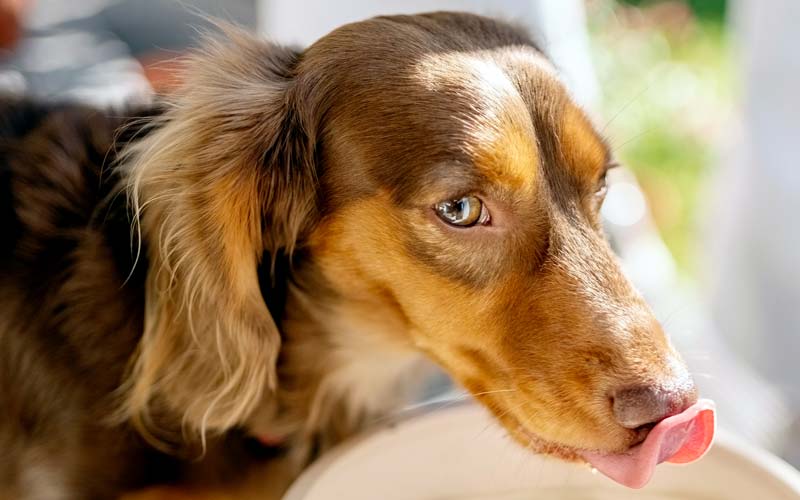
5. Long-Term Effects and Recovery
Alcohol poisoning can have lasting effects on your dog’s health, especially if not treated promptly. Potential long-term complications include liver and kidney damage, as these organs are heavily involved in processing toxins. Some dogs may also experience neurological issues due to the alcohol’s impact on the central nervous system.
After initial treatment, follow-up veterinary care is crucial to monitor your dog’s recovery. Regular check-ups will ensure that there are no lingering effects and that your pet’s organs are functioning properly. Early intervention and consistent care increase the likelihood of a full recovery and a healthy future.
Conclusion Alcohol Poisoning in Dogs
Alcohol poisoning is a serious threat to dogs, but with prompt action and proper prevention, it’s entirely avoidable. We’ve covered the key risks, symptoms, and immediate steps to take if your dog consumes alcohol. By understanding how alcohol affects dogs, securing potential hazards, and educating everyone in your household, you can significantly reduce the risk of poisoning.
If your dog does ingest alcohol, don’t hesitate to seek veterinary care right away. Early intervention is essential to minimize long-term damage and ensure your pet’s recovery.
As a responsible pet owner, stay vigilant, prevent exposure to alcohol, and always be prepared to act quickly in an emergency. Your dog’s safety depends on your awareness and proactive efforts—so take the steps today to keep your furry friend out of harm’s way.